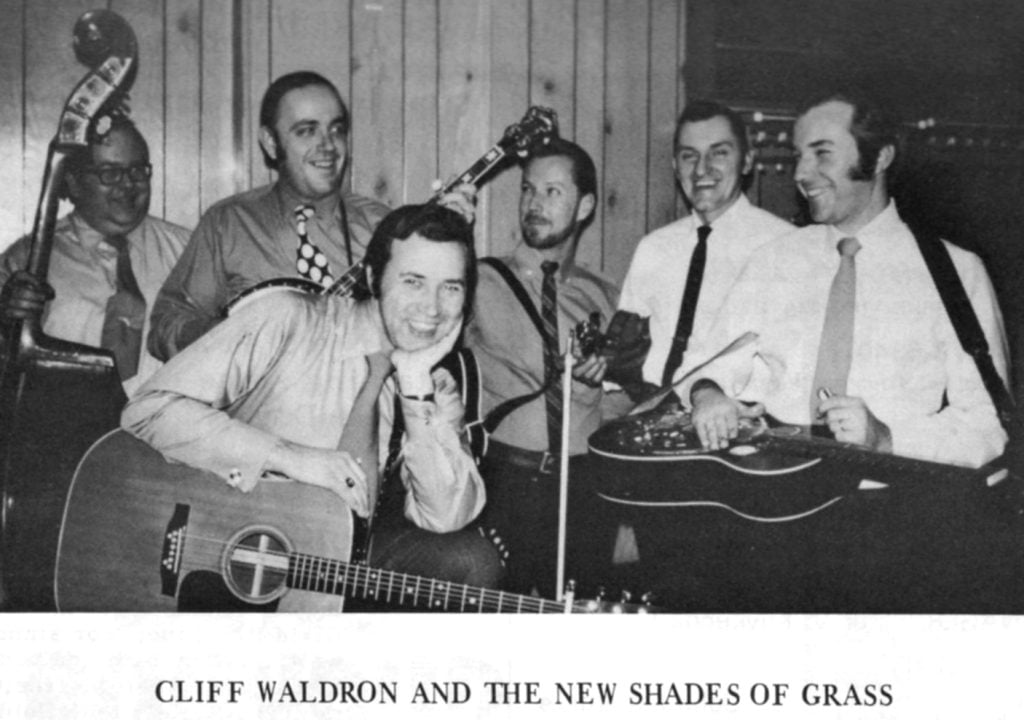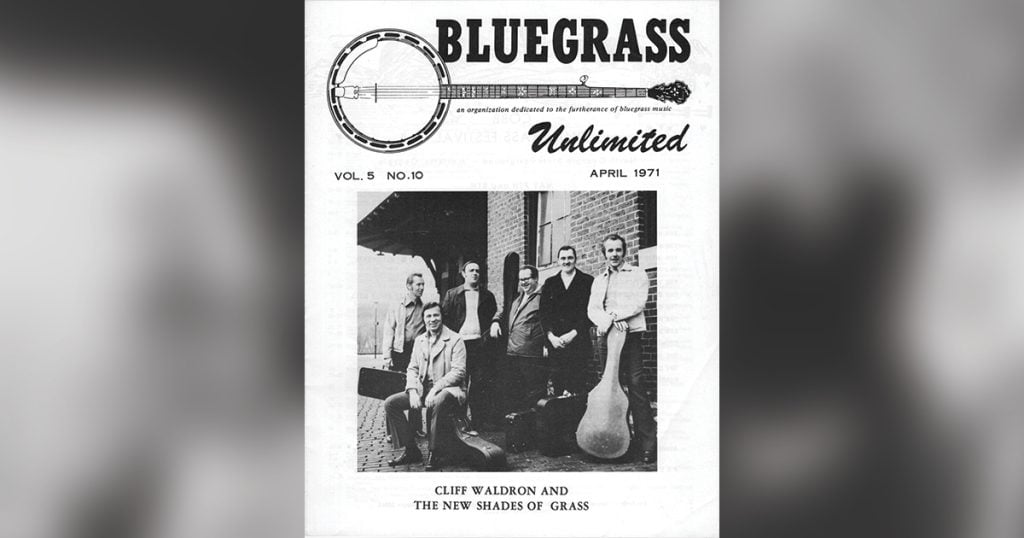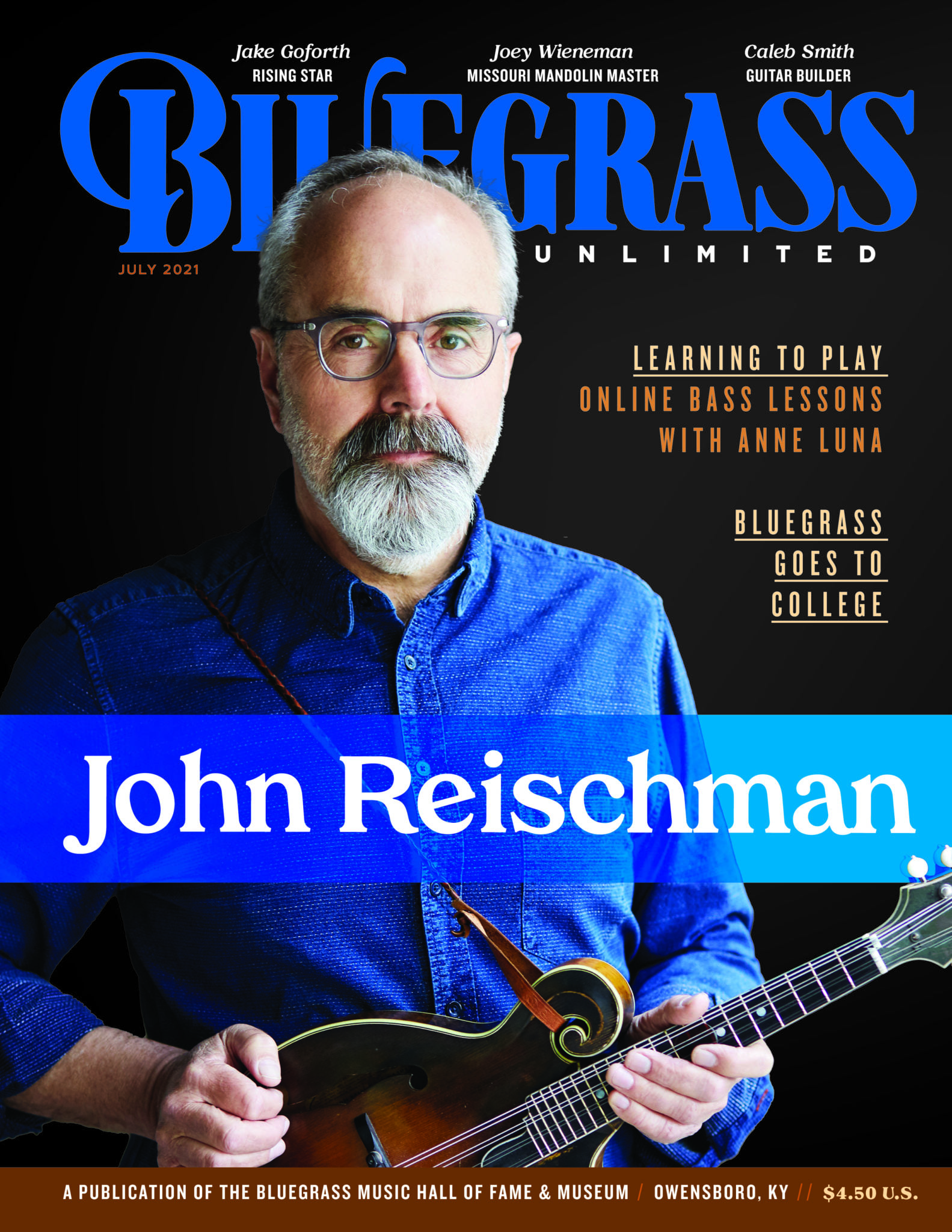Home > Articles > The Archives > Cliff Waldron and the New Shades of Grass
Cliff Waldron and the New Shades of Grass
Reprinted from Bluegrass Unlimited Magazine
April 1971, Volume 5, Number 10
Providing a strong lead voice and a rhythm guitar, Cliff Waldron maintains the position of front man. Handling bookings, M. C. work and any other business of the group. Cliff, a barber by trade, has achieved at 29 a driving manner of singing. His open-minded approach has brought songs from traditional, folk, blues, sacred and rock to the “Shades” repertoire. Originally from Jolo, West Virginia, Cliff started playing at station WNRG with the Southern Ramblers until he moved to Washington in 1963. He then worked with the Page Valley Boys for for three years, until joining Bill Emerson and the Lee Highway Boys which lasted until last May when Bill rejoined The Country Gentlemen. After working a few jobs with the Shenandoah Valley Cut-ups, Cliff reassembled the Lee Highway Boys, naming them The New Shades of Grass.
Cliff works with most capable musicians. Mike Auldridge, a University of Maryland graduate, from Washington, has worked with Cliff and Bill since March 1969. His musical interests began at 14 when he started guitar. Later came the banjo at 16 and the dobro at 22. But his interest eventually veered toward the dobro. However, he is a capable finger style guitarist along the lines of Merle Travis. Possibly a partial step forward would be the encouragement from more on dobro. He has blended the drive of Buck Graves and his own innovations with finesse and drive. His instrumental imagination and his baritone on the trios, are of major importance to the group. Mike is currently employed as a commercial artist in Washington, D.C.
Bill Poffinberger at 37 is the senior member. Still residing at his birthplace in Jefferson, Md. Bill started playing guitar and mandolin as a youngster. Seeing his Dad play fiddle, Bill eventually chose that instrument. He worked with Lucky Chapman and the Ozark Mountain Boys from 1954 to 1962. Next was Bill Berry and The Bluegrass Travelers whom he left to join Bill and Cliff. You will find his fiddling smooth and original. His knowledge of fiddle breaks is inexhaustible. You may detect the influence of Kenny Baker on his playing.

In March 1969, Ed Ferris, 36 years old and born in D.C., became the groups’ bass player. Though he started playing in 1960, Ed has exceptional command of the instrument. He began playing with the Oak Hill Mountaineers in 1960 and later joined Buzz Busby and the Bayou Boys in 1961. In 1962 he played briefly with Red Allen, Frank Wakefield and the Kentuckians. He joined the Country Gentlemen in 1964 and remained with them until 1969. He began playing with Emerson and Waldron in July 1970. Ed attributes much of his success to Bill Harrell. Without Bill’s help in 1961 Ed attests he would still be playing “off Beat”. Other influences are Jake Tullock and Tom Gray, a local bluegrass musician.
Rounding out the group in July 1970 were Dave Auldridge and Ben Eldridge. Dave, Mike’s older brother, works as a carpenter. He started playing guitar at age 20 and just recently began learning mandolin. He and his brother had their own radio show on WDON in 1955. Dave provides rhythm when playing guitar with the group and enhances the trio on vocals by blending a clear, rich tenor with Mike and Cliff.
Ben Eldridge, born in Richmond, Va. and now residing in Bethesda, Md., is 32 and a mathematician by profession. He started playing guitar at 10 (Sears, Roebuck-Gene Autry Melody Ranch Model-$13.00) and switched to banjo in 1954.
He formed a bluegrass band in high school and played on the campus radio station of Randolph-Macon college in Ashland, Va. In 1964 he moved to D.C., where he met Mike and Dave at a party. He continued playing “basement bluegrass” with them, Gary Henderson, Bruce Barnes and John Starling, all local musicians except John, who is an Army doctor in North Carolina. He became a regular viewer of Bill Emerson and occasionally picked for him when he was unable to play. Ben exemplifies the quest for perfection on the banjo. Constantly striving for improvement, he made important innovations in bluegrass. His ideas are full of life and vitality and a certain good-natured robustness. He is entitled to recognition “plus” for his contributions.
The New Shades of Grass is a hard-driving bluegrass group, playing with sincere feeling for the music and the people involved in it. Hearing them will be a rewarding experience for the most seasoned of bluegrass fans, as well as newcomers and will serve as an excellent introduction to the 1971 festival season.

